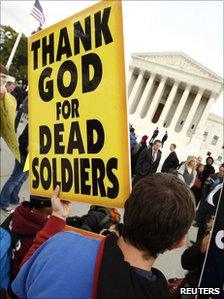US Supreme Court hears military funeral protest case
- Published

Church members marched outside the Supreme Court on Wednesday
The US Supreme Court has heard arguments about whether a fundamentalist church had the right to protest at a Marine's funeral.
The father of a Marine killed in Iraq is asking the court to reinstate a $5m (£3m) civil verdict against members of Westboro Baptist Church.
Members had carried signs with slogans like "Thank God for Dead Soldiers".
The case is being seen as a test of the First Amendment to the US Constitution, which ensures the right to free speech.
The court will weigh whether Albert Snyder should be allowed to grieve privately for his son against arguments the church members should be able to say what they want.
Mr Snyder filed the lawsuit in March 2006 after members of the church picketed the funeral of his son, Lance Cpl Matthew Snyder, who was killed in a Humvee accident.
Mr Snyder was originally granted an $11m (£7m) verdict in 2007 against the church for the intentional infliction of emotional distress.
That award was then reduced to $5m, before a federal appeals court in Virginia threw out the verdict altogether, citing the church's free speech rights.
Members of Westboro Baptist Church marched outside the Supreme Court building early on Wednesday with signs they would typically carry to military funerals.
The church, which is based in Topeka, in the state of Kansas, says US military deaths in Iraq and Afghanistan are punishment for the immorality of Americans, including tolerance of homosexuality and abortion.
But Mr Snyder has said the case is not about free speech but rather about how the church harassed him.
US Justice Ruth Bader Ginsburg said on Wednesday that the question was whether the First Amendment must tolerate "exploiting this bereaved family".
Church members, led by the Reverend Fred Phelps, have said they will not change their behaviour, no matter what the top US court decides.
"No American should ever be required to apologise for following his or her conscience," said Margie Phelps, Mr Phelps's daughter and the lawyer representing the church.
A decision on the case is expected early next year.